
Feb 18, 2021 | Archives, Feature |
By Abby Pomerleau, Contributing Writer
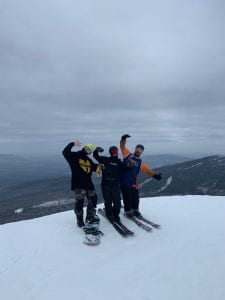
Left to Right: Simon Kern, Ryan Townsend and Sam
Scheff skiing and snowboarding at Sugarloaf Mountain.
Photo submitted by Abby Pomerleau.
The UMF Freeride team is making the most out of their season with weekly practices and optional competitions. The United States Collegiate Ski and Snowboard Association (USCSA) competitions are not being held this year, but the Freeride team is still enjoying the opportunity to ski. “Everyone on the team is still giving it their all and is continuing to push themselves because with or without competitions everyone just loves the sport in general,” said Bridget Stephenson, a sophomore who skis on the Freeride team.
Although there are no USCSA competitions, there are a few small competitions available to anyone and require a payment of $120. Some members of the team are planning on participating. “I’m really glad we have this opportunity to compete,” said Ryan Townsend, a junior who also skis on the Freeride team. “It gives us the ability to use the new skills we have been working on in a competitive setting.”
The Freeride team practices at Titcomb Mountain on Thursdays and Sugarloaf on Saturdays. The team also visits the Anti-Gravity Complex (AGC) next to Sugarloaf once a week to use their trampolines. This allows the team to work on new tricks before they try them on the slopes.
Being on a ski team provides the members with a COVID-safe social experience. “I really like to be around people with similar interests as I do,” said Townsend. “Everyone is really cool and very supportive.” By being on the Freeride team, it allows for its members to do what they love while meeting new people.
Regardless of the lack of regular competitions, ski season looks relatively normal to the Freeride team. “Everyone still gets to go skiing together and supports each other to try new things,” said Stephenson. “Everyone on the team is there to do what they love, so even if there wasn’t a team we would all be out there anyway. The lack of competition doesn’t stop us.”
Skiing isn’t just about the competitions for some of the team members. “Skiing has fully shaped my experience here at UMF,” said Townsend. “For me, being outdoors is a major part of my life and skiing contributes to that. Although we can’t regularly compete, skiing on this team is important to me and how I spend my time here at UMF.”
Like Townsend, many UMF students enjoy skiing as a hobby. Titcomb Mountain is roughly 5 minutes from campus, while Sugarloaf is roughly 55 minutes from campus. Having these mountains relatively close to UMF allows students to have the ability to ski when they please.
The Freeride team loves when newcomers join the team. “Everyone on the team is so welcoming and there are people on the team from all ski levels,” said Stephenson. “We have people who are completely new to park skiing and snowboarding, and people on the team who are nationally ranked, so there are plenty of people to seek advice from.”
To join the Freeride team, email the Snow Sports Director, Scott Hoisington, at james.hoisington@maine.edu.
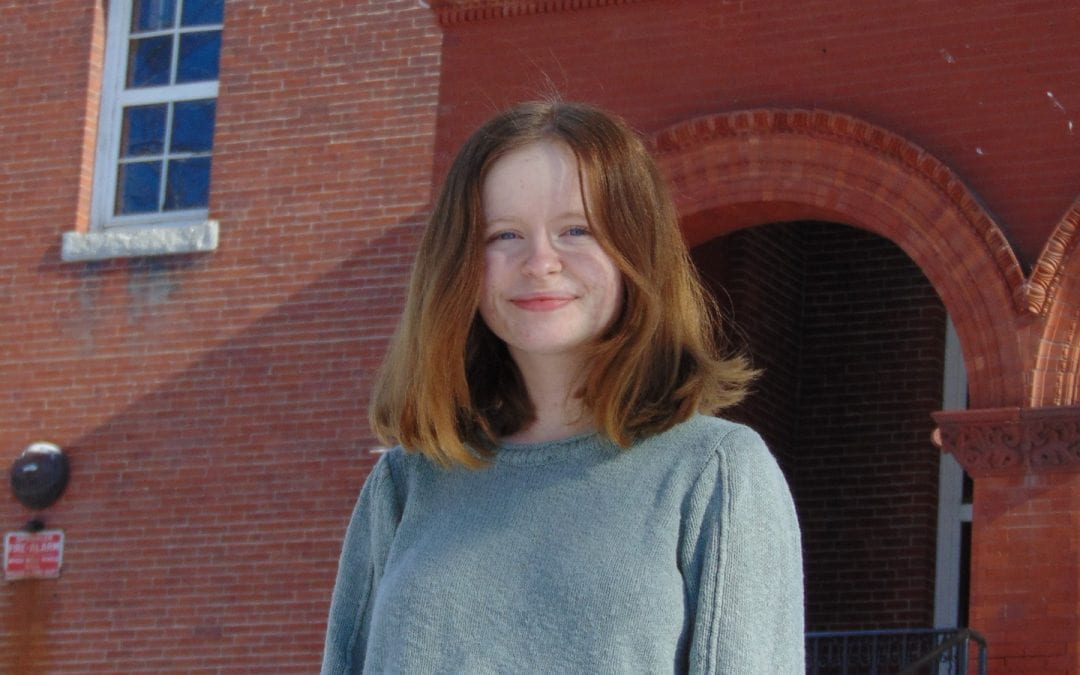
Feb 18, 2021 | Feature |
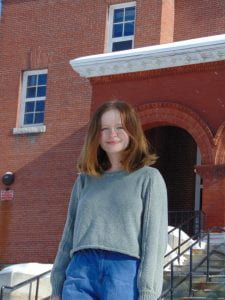
Clefnotes President Gacie Vaughn by Sam Shirley
By Samantha Pond, Contributing Writer
Two of UMF’s acapella groups, Deep Treble and the Clefnotes, are finding ways to continue making music despite the pandemic.
In March 2020, both groups were thrown for a loop when schools started to close down and no one was able to rehearse together. All plans for Deep Treble and the Clefnotes were brought to a halt, as singing in groups was not recommended by the Center for Disease Control (CDC).
Over the summer, both of UMF’s acapella groups worked online to plan for the fall semester. Working together was necessary for groups to stay positive. “We frequently Zoom to check in on each other and discuss future club plans,” said Gracie Vaughan, second-year student and the president of the Clefnotes.
Both groups on campus are not giving up on rehearsals and meetings during these challenging times. Third-year student and co-president of Deep Treble, Kaitlynn Tarbox, has shown great determination to help keep Deep Treble together. “We have still been meeting twice a week during the pandemic with heavily enforced COVID procedures to ensure everyone’s safety,” Tarbox said. “We have to keep 10 feet of distance between everyone while we sing and still be masked to follow CDC guidelines.”
Rehearsals for the Clefnotes are looking a little different than Deep Treble’s rehearsals. “We no longer have full group meetings and meet instead in smaller groups of less than six people,” Vaughan said. “While it has created some physical challenges, it has truly shown many of our members’ determination to keep Clefnotes fun.”
With constant changes in regulations, members not able to attend, and not being able to find spaces for each group to rehearse and perform as a whole, both groups have faced challenges. “It has been difficult to find performance opportunities that were not virtual,” said Tarbox. “It is very difficult to put together a virtual concert so in-person performances are preferred if we can.”
For the acapella group, Clefnotes have felt differing struggles as they continue rehearsals in small groups and on Zoom. “Additionally, the stress of the pandemic itself has only intensified the stress of being in college, as many of us are juggling jobs, clubs, and social lives,” said Vaughan.
Despite the hoops the Clefnotes and Deep Treble have had to jump through to be able to practice together, singing acapella has kept members optimistic about the rest of the semester. “We are remaining a positive, safe space…so that our members can have a break from academics and still be able to see each other,” Tarbox said. “All of our decisions are run by not only our [executive] board members, but by the group as well.”
Auditions have become a struggle for both groups, as there is no place for them to be held when taking into consideration the conflict of safety when doing so. “[Deep Treble] held auditions last semester and filled some of our available spots, but this semester, with COVID-19 getting worse, we decided to hold off on auditions until next fall,” said Tarbox. The Clefnotes accepted video submissions for their auditions. Those who have auditioned and qualified for callbacks will receive their callback confirmation via email by Feb. 12.
If students would like more information about either group on campus, please contact umf.deeptreble-group@maine.edu for information on Deep Treble or gracie.vaughan@maine.edu for Clefnotes or DM them on Instagram (@umfclefnotes).
Feb 18, 2021 | Feature |
by Maxen Ryder, Contributing Writer
The Nightmare Club provides a pleasantly scary experience for their group by hosting activities and events in order to create a positive, safe community.
Every week, members of the club vote on a horror movie to watch together. The end result is a group experience with the intent of community, fun, and, of course, scares. The Nightmare Club is enforcing the same COVID-19 guidelines the rest of the school follows with masks and social distancing. Additionally, students who plan on going to the weekly events confirm they will be participating in advance to the meeting. This way, the club is still safe in regards to the pandemic.
The club is a fun way to safely spend a night with friends and meet new people in Farmington’s thrilling night life. “Nightmare Club has always focused on being an environment where everyone is welcomed and just getting to know each other through our shared interest in horror and the supernatural,” said club President Abby Young.
While the movies are often scary, the atmosphere in the room is much more lighthearted. “The meetings are often filled with lighthearted jokes and commentary about the movies being watched and really provide students with an almost humorous break from the stresses of college,” said Young.
The Nightmare Club originated from Professor Paul Gies’ English class on H. P. Lovecraft. “It’s a club for nerds,” said Gies, the Nightmare Club’s faculty advisor. “In Lovecraft class, I think I turn non-nerds into nerds every year.”
Gies uses the term in a positive, light mannered way. “A nerd in modern terms is just someone who is not ashamed of how interesting they find some author, some genre, some art form, some series, some game series, some mythos,” said Gies in an email. “Lovecraft, who’s sort of my bailiwick, was sometimes a great writer, unmatched really, but at other times he was mediocre; we forgive him even as we smirk at how horrible the good guys are in “The Hound” or how wimpy Randolph Carter is.”
The Nightmare Club is always looking for new members to make their community even better. “We really just aim to have everyone feel safe and welcomed and encourage everyone, even if you don’t like the horror genre, give us a try because we try really hard to make sure everyone is safe and comfortable,” said Young.
Students interested in joining the Nightmare Club should email umf.nightmare-group@maine.edu before going to a meeting or join their public Facebook group, “UMF Nightmare Club.” They meet on Friday nights in Roberts 023 at 7:30p
Feb 18, 2021 | News |
By Chelsea Davis, Contributing Writer
Full-time students who qualify for federal financial aid by filling out the Free Application for Federal Student Aid (FAFSA) may also qualify for federal work study (FWS), which allows students to get a job on campus while also being able to prioritize classes and coursework.
Work study provides part-time jobs for undergraduate students with financial need and allows students to earn money to help pay education expenses. This program encourages community service work and work related to the student’s course of study. “For FWS specifically, the student would have the award as part of their financial aid package since FWS is a need-based financial award contingent on FAFSA information,” said Joseph Toner, Assistant Director of Financial Aid at UMF. “However, having FWS is not a prerequisite to working on campus as students can be hired within the work initiative program or within a department-funded position.”
UMF has a wide variety of work study jobs on campus open only to students who qualify for FWS. “We have students working in just about every department on campus, from admissions, to athletics, to the library,” said Toner. “Our student workers literally make our campus go.”
Troy Johnson, an employee at the Fitness and Recreational Center (FRC), has had a positive experience working as a part of FWS. “I like working in the gym atmosphere,” Johnson said. “I have made new connections working with other students on campus. I would highly recommend federal work study for students in need of a little extra money to help pay off education expenses.”
The level of commitment that is expected for student employment jobs are just like any job. Supervisors will expect student workers to show up on time, perform quality work, and follow instruction. “As long as you follow what is asked of you and you get everything done on time it is a super easy job and a great experience too,” said Elena Guarino, who works in the library through FWS.
Because FWS is part of the student’s financial aid package and the job is also on campus, students working FWS positions are able to easily prioritize their classes and coursework while also doing their FWS job. “Some things that I do at my job consist of cleaning equipment, checking students in, and I can also work on homework,” Johnson said.
With a full-time courseload, Johnson is able to work up to four hours a day three days a week. “Typically these work study jobs have flexible schedules,” said Johnson.
Utilizing work study is beneficial because working on campus allows students to gain real-life work experience that can help students learn interpersonal communication skills and time management while also earning money to help pay for some of the costs associated with attending college. “Employers love to see student work on a resume,” said Toner. “It shows that the student gained valuable experience while in college, even if the work now is not directly related to your plans for a post-UMF career.”
To locate the FWS job list and learn about FWS, work initiative, and on-campus jobs, students can email joseph.toner@maine.edu or log into the MyCampus Portal, go to the Student Services pull-down menu, and select Financial Services. Work study positions will start opening up at the end of the spring. Once students find a job on campus they would like to pursue, it is important to reach out to the supervisor of that certain work position, it is best to reach out through email.
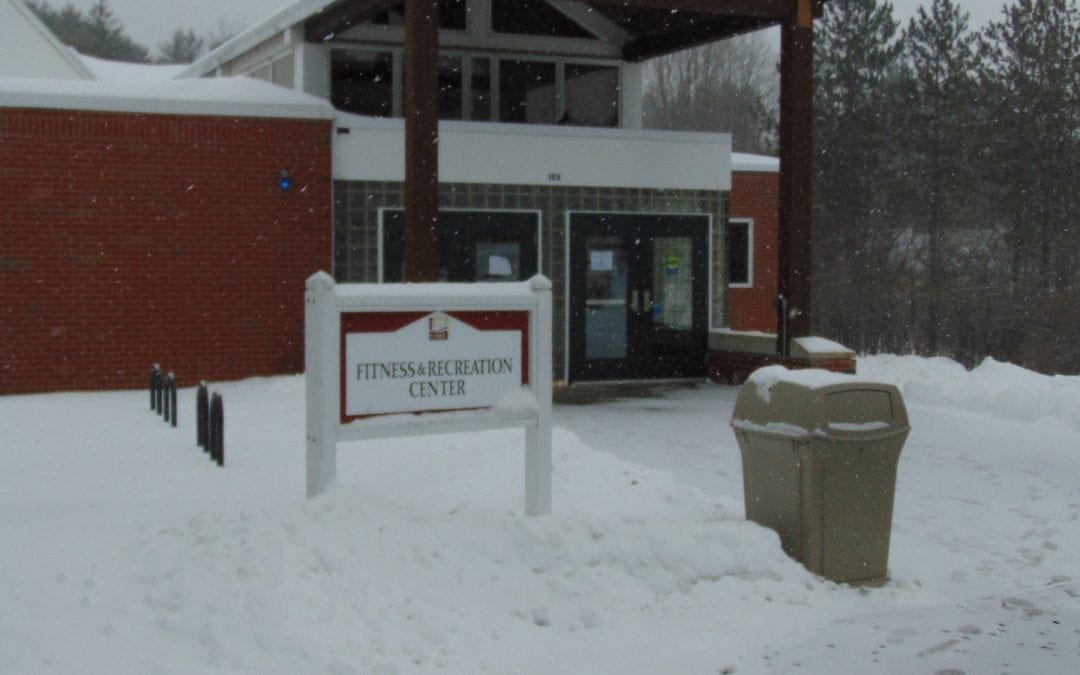
Feb 18, 2021 | Feature |
By Marissa Goodwin, Contributing Writer
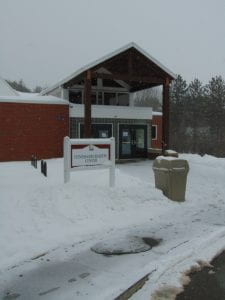
The FRC by Sam Shirley
As the spring semester is starting to gear up, students gather to safely play intramural sports with their friends to be active and take a break from the stress of classes.
Intramurals, which are tournaments of games organized by the students that are held at the Fitness and Recreation Center (FRC) on campus, are a great way to safely bring your friends together in a friendly competition. Jade Petrie, a junior, has participated in intramural basketball, pickleball, and kickball since her sophomore year. “It’s a fun way to get active while being with your friends,” said Petrie.
UMF has offered a variety of intramural sports such as basketball, volleyball, kickball, soccer, and pickleball. This year, the options are limited due to safety processions put in place for COVID-19. Petrie’s favorite part about intramurals is that she gets to be social and active simultaneously. “It’s a cool way to meet new people,” said Petrie.
Although intramurals are a little different because of COVID-19, students are still safely participating. “Students can stay involved while being active and social at the same time,” said Petrie.
Jared Smelter, a senior who has participated in intramurals since he was a junior, enjoys intramurals because he gets to have fun while playing sports with his friends. He agrees that intramurals have been different due to COVID-19 but says that he is happy UMF is still offering them. “We have less options for sports because we can’t have contact,” said Smelter, “but it is better than nothing and I am glad it is still being offered.”
The advantage of playing intramural sports is that it’s a low-stakes way to keep busy and take a break from academics. “It’s offering sports without actually playing a school sport at UMF,” said Jonah Sautter, a junior who has been playing intramurals for three years and is a referee at UMF intramurals.
Intramurals are great for those who don’t want to make the commitment to varsity sports, but miss the supportive, competitive environment of sports. “It is perfect for high school athletes who maybe miss playing sports or just competitive people,” said Sautter.
With all of the changes that are happening during the time of COVID-19, students are using intramurals as a way to get out and do something. “I think intramurals are helping students,” said Sautter. “It gives a sense of normalcy that is nice.”
To find more information about UMF intramurals, visit the UMF Intramurals Instagram page @umfimsports and directly message the account. Students are asked to fill out an application to sign up and pay a $20 deposit to hold their spot to ensure that they will show up to the games.





